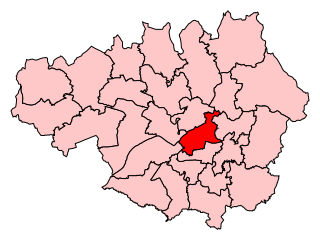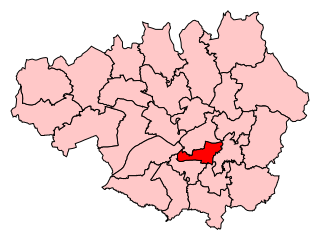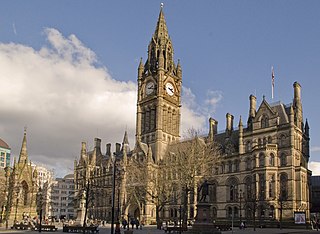Related Research Articles


Manchester Central is a parliamentary constituency in Greater Manchester created in 1974 represented in the House of Commons of the UK Parliament since 2012 by Lucy Powell of the Labour Party and Co-operative Party.

Manchester Gorton is a constituency represented in the House of Commons of the UK Parliament by Labour's Afzal Khan, who was elected at the 2017 general election. It is the safest Labour seat in Greater Manchester by numerical majority and one of the safest in the country.

Cheetham is an inner-city area and electoral ward of Manchester, England, which in 2011 had a population of 22,562. It lies on the west bank of the River Irk, 1.4 miles (2.3 km) north of Manchester city centre, close to the boundary with Salford, bounded by Broughton to the north, Harpurhey to the east, and Piccadilly and Deansgate to the south.
Liverpool Scotland was a constituency represented in the House of Commons of the Parliament of the United Kingdom. It elected one Member of Parliament (MP) by the first past the post system of election.

Blackley and Broughton is a constituency represented in the House of Commons of the UK Parliament by Graham Stringer. He was first elected in 1997 for the former Manchester Blackley and prior to this was Leader of Manchester City Council. The constituency covers north Manchester and east Salford.
Manchester Ardwick was a parliamentary constituency in the city of Manchester which returned one Member of Parliament (MP) to the House of Commons of the Parliament of the United Kingdom. Elections were held by the first past the post voting system.
Bolton East was a borough constituency in the town of Bolton in Greater Manchester. It returned one Member of Parliament (MP) to the House of Commons of the Parliament of the United Kingdom.
Middlesbrough West was a parliamentary constituency in the town of Middlesbrough in North East England. It returned one Member of Parliament (MP) to the House of Commons of the Parliament of the United Kingdom, elected by the first-past-the-post voting system.
Nottingham Central was a borough constituency in the city of Nottingham. It returned one Member of Parliament to the House of Commons of the Parliament of the United Kingdom.

Manchester Openshaw was a parliamentary constituency centred on the Openshaw district of Manchester. It returned one Member of Parliament (MP) to the House of Commons of the Parliament of the United Kingdom.
Birmingham Stechford was a parliamentary constituency centred on the Stechford district of the city of Birmingham. It returned one Member of Parliament (MP) to the House of Commons of the Parliament of the United Kingdom, elected by the first-past-the-post voting system.

The City of Manchester forms part of the metropolitan county of Greater Manchester, which had its county council abolished in 1986. Manchester consists of several districts, but these districts do not represent a tier of government.
Manchester Exchange was a parliamentary constituency in the city of Manchester. It returned one Member of Parliament (MP) to the House of Commons of the Parliament of the United Kingdom, elected by the first past the post system.
Manchester Moss Side was a parliamentary constituency in the Moss Side area of the city of Manchester. It returned one Member of Parliament (MP) to the House of Commons of the Parliament of the United Kingdom, elected by the first past the post system.
Manchester Clayton was a parliamentary constituency in the city of Manchester. It returned one Member of Parliament (MP) to the House of Commons of the Parliament of the United Kingdom, elected by the first past the post system.
Portsmouth Langstone was a borough constituency in Portsmouth. It returned one Member of Parliament (MP) to the House of Commons of the Parliament of the United Kingdom, elected by the first past the post system.

Stockport South was a borough constituency which returned one Member of Parliament (MP) to the House of Commons of the Parliament of the United Kingdom from 1950 until 1983.
Manchester Platting was a parliamentary constituency in Manchester. It returned one Member of Parliament (MP) to the House of Commons of the Parliament of the United Kingdom, elected by the first past the post system.